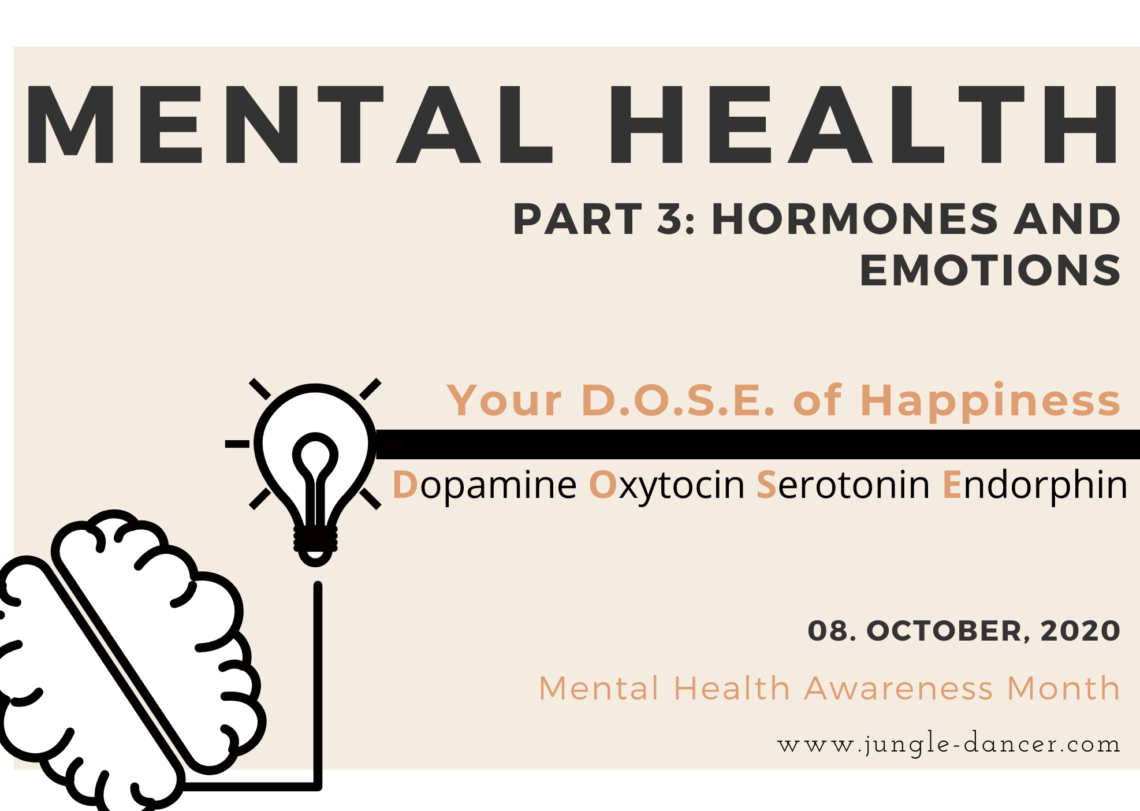
How are our hormones and emotions correlated?
Hormones and emotions: a complicated, but very real and measurable relationship. Sometimes, when we struggle or experience hardship, it is not merely because of our choices. More often than not, it is about our brain chemistry.
The science of the human mind says that our brain is primarily wired for our survival, but interestingly enough, the hormones that evolved to ensure our survival and to sharpen our instincts, are also the hormones that determine our happiness levels.
When it comes to hormones and emotions, there are four highly relevant hormones: dopamine, oxytocin, serotonin and endorphin. I remember them easily when I take the first letter of their names and create the word dose. Thus, here is your D.O.S.E. of happiness.
1. Dopamine: motivation and rewards
Dopamine creates for us urges of motivation every time when we need to put in an effort to accomplish our goals. Once we do, the hormone also signals our brain for pleasure and happiness. In this way, dopamine ensures that we have the ability to feel rewarded for our efforts.
The problematic part about dopamine is that is highly addictive. Thus, many drugs work on the principle of increasing the levels of dopamine in our body. Some drugs are used at lower doses for treating diseases like ADHD; while others – such as cocaine – cause serious drug addiction.
Consequences of low dopamine levels
Some typical symptoms of dopamine deficiency include, but may not be limited, to:
- depression;
- weight gain;
- procrastination;
- lack of self-esteem or enthusiasm;
- oversleeping, trouble to wake up in the morning, and in general – low energy levels;
- feelings of low self-worth, anxiousness, hopelessness.
If you are experiencing any of these symptoms, but you are not sure if your dopamine levels are responsible for them, consult a doctor. You can check this easily with a simple blood or urine test. Understand that your hormones and emotions are not mutually exclusive and give yourself the chance to overcome the feeling of “it is all my fault because I am lazy and worthless”.
What can you do to trick your mind and spike your dopamine levels?
Get into the habit of stimulating your brain – in a healthy and drug-free way – to consistently spike up your dopamine levels. The easiest way is to set small, but manageable, goals. Make a list of activities you enjoy and create new benchmarks as you progress. Celebrate after accomplishing each one – no matter how small or insignificant it seems.
Other useful approach is to encourage and help people in your community or team. When you help them and they achieve their goals, you will feel like you had at least a small part into it. Recognize the successes of other people, reach out to them, share the happiness.
2. Oxytocin: trust
I have already talked about the importance of trust – firstly, as a marker of emotional health; and second, as an important factor in our relationships with other people. As I have already explained, since we are social beings, our overall psychological well being depends on the bonds we form with our people. However, how honestly we maintain those relationships depends greatly on our ability to trust other people.
Oxytocin does precisely this: it gives us a feeling of trust and gives us the courage to not only build, but also nurture, intimate relationships with people. In pop-culture, some people call this hormone “the love hormone”, since it gives us the feelings of safety and comfort that we experience when we are in love.
It is interesting to note that oxytocin in a way contrasts dopamine. While dopamine makes us borderline euphoric when we feel rewarded, oxytocin makes us feel calm, safe, and less stressed.
Consequences of low oxytocin levels
Some typical symptoms of oxytocin deficiency include, but may not be limited, to:
- stress;
- loneliness;
- inability to bond with other people and wish to isolate;
- feelings of detachment;
- sometimes, insomnia.
In addition, oxytocin deficiency increases our risk to depression, mostly because it makes us feel fully disconnected from all of our relationships. This often leaves us feeling like we are not belonging anywhere and like there is no one we could ask for help.
What can you do to trick your mind and spike your oxytocin levels?
Even when you do not feel like it, reach out to other people. Share some hugs, laughter and entertainment. Other more lonely activities that might help you get your shot of oxytocin are massages, listening to music, reading, exercise. If you are fan of DIY projects, consider doing them with a friend, partner, or family member. Last, but not least, limit your time on social media and in front of electronic gadgets, and try to spend more time outdoors with some other people.
3. Serotonin: significance
Every time when we feel important, cherished, or admired – the hormone serotonin rewards us with pleasant emotions. In other words, it is the pleasure we get when we find ourselves enjoying a high-status situation in our social circles.
This might sound a bit egocentric or narcissistic, but in essence, serotonin makes sure we prevail over life’s difficulties by promising us the reward of feeling significant. It is the hormone that enables us to grow privately and professionally and as such, it is creates some of the most desired and needed positive emotions. Precisely because of this, many state-of-the-art antidepressants work in such a way that they increase the levels of serotonin in our bodies.
Consequences of low seratonin levels
Some typical symptoms of seratonin deficiency include, but may not be limited, to:
- mood swings;
- depression and feeling worthless and hopeless
- anxiety;
- panic attacks;
- problems with memory and focus;
- obsessive-compulsive disorders;
- insomnia.
Low levels of serotonin are also correlated to criminal activities. People become part of criminal “communities” because they enable them to feeling significant through engaging in criminal behavior. Other very common manifestation of low serotonin levels is an unhealthy and extreme attention-seeking behavior as a try to secure the needed amount of serotonin.
What can you do to trick your mind and spike your serotonin levels?
Create “I did it” moments for yourself. Challenge yourself in many different ways and forms: physically, intellectually, spiritually. Reach out to activities that give you a sense of purpose and meaning – even if others find this funny or a waste of time. Maybe this is why I keep my blog, who knows?
When you do not feel in the mood to challenge yourself, think a bit about your past achievements. Re-live your former glory, especially if you had a stressful day and you start to feel like a failure.
A more natural way to spike up your serotonin levels is simply to immerse yourself in sunshine for a short while. According to some studies, ultra-violet light can help the Vitamin-D and serotonin production.
4. Endorphin: pain-killer
Endorphins mask pain by inhibiting the transmission of the pain signals in our central nervous system and later, by causing euphoria. In this way, endorphins are somehow similar to dopamine, since both can somehow make us feel euphoric. Dopamine rewards us, endorphin masks our pain, and both make us happy.
However, they are even more connected when it comes to physical exercise and running is the most prominent example. What happens is that when we are experiencing pain during running, endorphins block the pain signals and induce euphoria, after which dopamine is released. Remember though, that the need to constantly get that urge of dopamine, was the reason why people tend to get addicted to drugs. Except, in this case, the drug is running. There is even a specific term for this running-endorphins-dopamine interplay – it is called “runner’s high” – and is the reason why running is considered one of the most addictive sports.
Consequences of lack of endorphins
Some typical symptoms of endorphin deficiency include, but may not be limited, to:
- lethargy;
- body pain, such as headaches and back pain;
- mood swings;
- depression.
What can you do to trick your mind and spike your endorphins levels?
Needless to say, exercise. However, laughter is also extremely effective when in raising our endorphin levels, so seek out comedy shows or movies. Also, remember that endorphins are primarily “pain-killers”, so exposing yourself to some mildly unpleasant experiences – such as eating spicy food or cold showers – can also be helpful.
Final words on our hormones and emotions
In a broad context, one can think of the D.O.S.E (dopamine, oxytocin, serotonin and endorphine) hormones as the happiness hormones. Dopamine makes us happy by motivating us to accomplish our goals and grants us (addictive) rewards. Oxytocin makes us happy by enabling us to trust other people, bond to them, and create meaningful relationships. Serotonin makes us happy by boosting our self-esteem by making us feeling significant and valued member of our community. Finally, endorphines make us happy by exchanging our pain with euphoria.
These hormones and emotions of joy, accomplishment, and purpose in our life are in a constant interplay with one another. Lack of any of these hormones can cause depression, anxiety, and feelings of loneliness, isolation, and low self-worth; but, we can try to spike up their levels by challenging ourselves as much as we can. These challenges can come in the form of physical activity, meditation, or simply taking upon a new hobby. And, of course, reaching out to other people, not only to have fun with them, but also to share our burden with them.
Last, but not least, keep in mind that our hormones and emotions greatly determine the quality of our life. If you feel hopeless or with no wish to try any of the suggested activities that could raise the level of your happiness hormones, consider reaching out for help. You are not alone.
Mental Health Awareness Month
This post is the third one in my series on mental health. October is a mental health awareness month, so I am inviting you all to think about this topic and your overall psychological and emotional well-being. This should no longer be a taboo topic.
If you like what you read, or think that the ideas I share could be of relevance to someone you know; to someone who struggles – please reach out to them. Be kind, be supportive, be caring. Thank you.
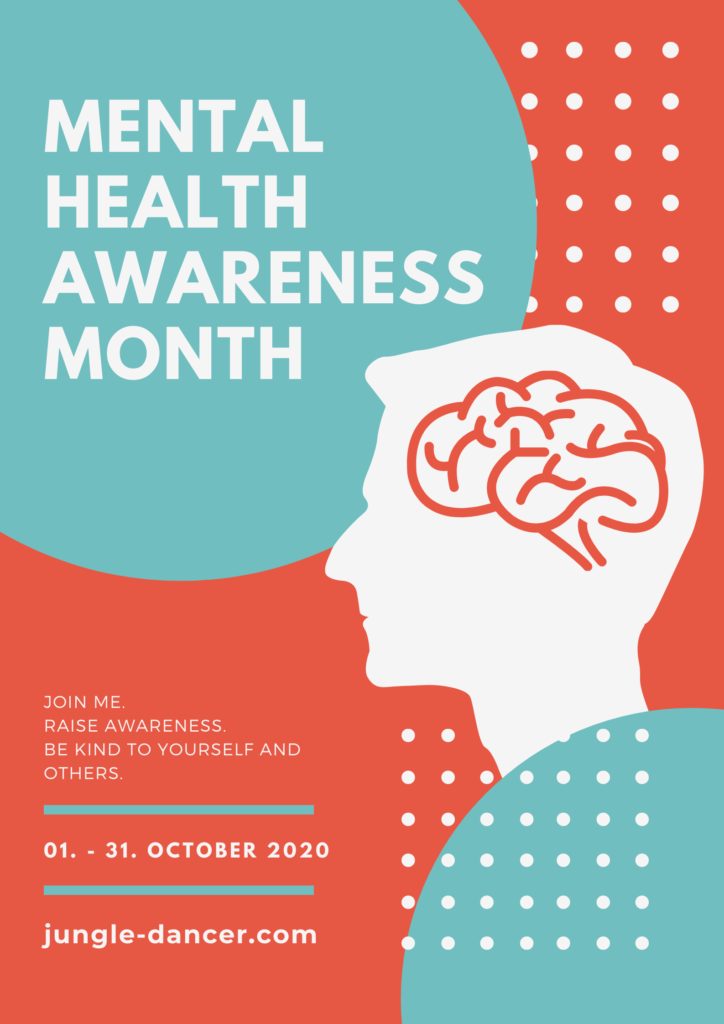



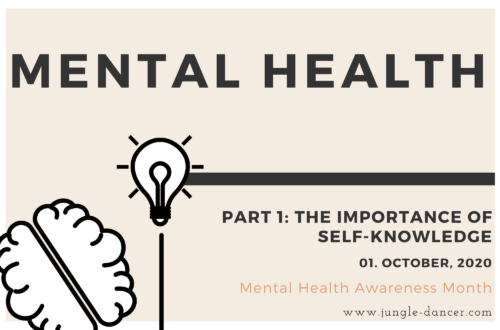
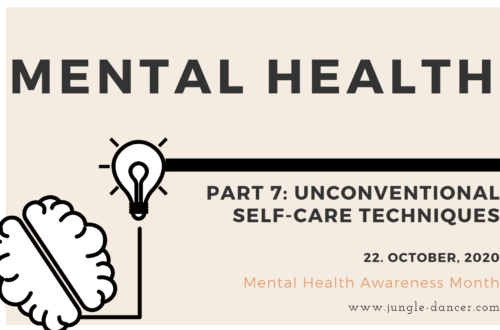
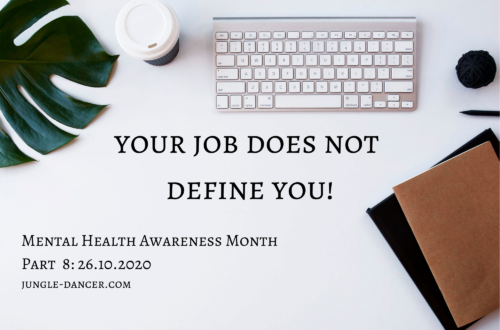
3 Comments
Johnny B
Awesome post! I am fascinated as well with how the mind works. The release of neuro receptors is so fundamental in how we feel moment to moment, but it doesnt get enough attention.
I fond starting my day with some exercise for even 10 minutes, followed by some breathing exercises and meditation is a great way to start the day. It releases a cocktail of these hormones to set you going in the right direction. Also, not doing negative things like looking at your phone in the first 30 minutes and no media “news” until the mind is ready also is key.
Keep up the great work jungle dancer!
Pingback:
Pingback: